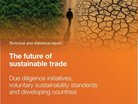Sustainable Trade: Tackling Scope 3 Emissions

The international trade market faces mounting scrutiny for its sustainability practices, particularly concerning Scope 3 emissions across global value chains (GVCs).
The United Nations' 2024 Future of Sustainable Trade (FOST) report illuminates this critical issue, outlining actionable steps to address these emissions and align global trade with sustainable development goals.
A comprehensive blueprint for sustainable trade
- Mapping the regulatory landscape of sustainability due diligence, including Scope 3 emissions reporting.
- Leveraging voluntary sustainability standards (VSS) to inform owing diligence implementation.
- Assessing the impact of sustainability due diligence on producers in developing nations.
- Recommending inclusive strategies for sustainable trade governance.
These goals reflect the urgent need to balance environmental imperatives with economic and social considerations, particularly for vulnerable economies.
From voluntary guidelines to mandatory measures
A major trend highlighted in the report is the global transition from voluntary governance models, like VSS, to mandatory regulatory frameworks.
These include:
- Due diligence legislation: Increasingly mandatory for businesses operating across borders.
- Scope 3 emissions reporting: Now, it is a critical requirement for companies to account for emissions across their supply chains.
These measures address pressing issues such as deforestation, human rights abuses and climate change. However, the transition brings challenges, particularly for producers in developing countries.
The role of VSS
VSS plays a pivotal role in integrating international conventions into trade practices.
By providing the infrastructure for compliance, they:
- Assist businesses in tracking Scope 3 emissions.
- Help align existing practices with emerging regulatory requirements.
Yet, the report warns that gaps in alignment between VSS and mandatory frameworks could render these standards obsolete unless they adapt swiftly.
Challenges for developing nations
Producers in developing countries face unique hurdles in meeting new regulatory demands.
These include:
- High compliance costs: Straining already limited resources.
- Market segregation risks: Potentially marginalizing smallholders, indigenous peoples and informal workers.
- Regulations like the European Deforestation-free Products Regulation (EUDR): Targeting commodities like cocoa, coffee and palm oil, the EUDR mandates geolocation and traceability data—requirements challenging for small producers, especially in regions like Peru.
Inclusivity and innovation: Addressing systemic barriers
The report highlights the importance of inclusivity in sustainable trade governance.
To ensure fair value distribution and broad stakeholder involvement:
- Phased compliance strategies: Allowing producers time to adapt.
- Regional adaptations: Making regulations more practical for local contexts.
- Technological solutions: Innovations like blockchain-based traceability systems enhance transparency and simplify compliance processes.
"Without the means to invest in sustainable development and transform their energy and food systems, developing countries are falling even further behind. A two-track world of haves and have-nots holds clear dangers for every country. We urgently need to rebuild global cooperation and solve our current crises in multilateral action."
Leveraging trade for climate solutions
The FOST report highlights that trade can be vital in addressing the climate crisis.
By fostering green and blue economies, the UN collaborates with governments to ensure trade becomes a solution rather than a problem.
Key initiatives include:
- Promoting circular economies: Turning waste into valuable resources.
- Encouraging innovative business models: Supporting collaborations and consumer education to reduce emissions.
A path forward for sustainable trade
According to the FOST report, sustainable trade is both a necessity and an opportunity. International cooperation, balanced regulations and strategic investments are essential to ensure that trade contributes positively to global sustainability goals.
By addressing Scope 3 emissions throughout GVCs, trade can become a powerful tool for environmental, economic and social progress.
The report's message is clear: sustainable trade is achievable, but it requires a collective commitment to innovation, inclusivity and long-term planning.
Make sure you check out the latest industry news and insights at Scope 3 Magazine and be part of the conversation at our global conference series, Sustainability LIVE and Procurement & Supply Chain LIVE.
Discover all our upcoming events and secure your tickets today. Subscribe to the Scope 3 Magazine newsletter.
Scope 3 Magazine is a BizClik brand.
- The Evolving Role of Chief Sustainability OfficersScope 1 2 and 3
- Scope 3: Baltic States end Russian Energy DependenceSustainable Procurement
- Nissan Expands Green Steel to cut Scope 3 EmissionsSupply Chain Sustainability
- Evri & Protega Tackle Scope 3 via Sustainable PackagingTransportation & Logistics

